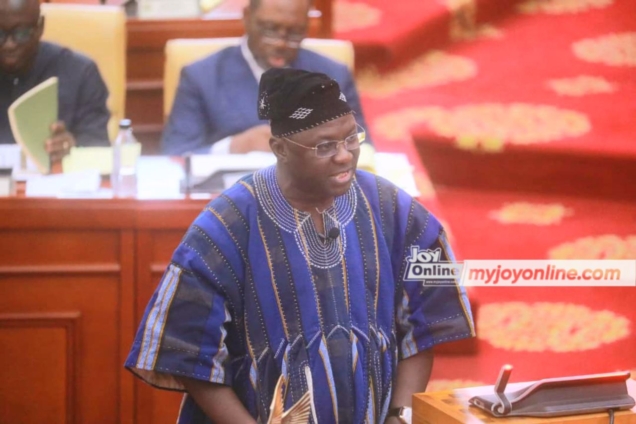
Audio By Carbonatix
The Institute of Statistical, Social and Economic Research (ISSER) has called for comprehensive fiscal reforms in its 2024 Mid-Year Budget Review, titled “A Critical Assessment of the 2024 Mid-Year Budget by ISSER.”
The review highlights the need for effective revenue generation and expenditure control to stabilize Ghana’s economy and foster sustainable growth.
The review notes that total revenue and grants for 2024 have been revised upward by 0.5% to GH¢177,220 million (17.4% of GDP) from the initial budget target of GH¢176,414 million (16.8% of GDP).
This increase is primarily attributed to higher non-oil non-tax revenue, which rose from GH¢14,837 million (1.4% of GDP) to GH¢15,638 million (1.5% of GDP) due to dividends from interest accrued in the Energy Sector Levy Act (ESLA) accounts.
Conversely, total expenditure (commitment basis) has been revised downward by 2.1% to GH¢219,749 million (21.5% of GDP) from the original projection of GH¢226,681 million (21.6% of GDP).
Despite the downward adjustment in expenditures, the review emphasizes that the significant increase in spending from 2023 is largely driven by interest payments.
The overall budget deficit on a commitment basis has been revised from GH¢50,267 million (4.8% of GDP) to GH¢42,529 million (4.2% of GDP), while the primary balance remains at a surplus of 0.5% of GDP.
ISSER proposes several key fiscal measures to address these challenges:
1. Revise Stability Agreements: Existing companies in the extractive sector whose stability agreements are expiring, as well as new entrants, should revise their agreements to boost the revenues Ghana receives. These new agreements should also be easier to monitor.
2. Enhance Tax Collection: Implement more efficient tax collection measures to avoid introducing new or higher taxes that burden the private sector and reduce global competitiveness.
3. Streamline Port Operations: Harmonize the number of government agencies operating at the ports to reduce human interface and revenue losses, curbing rent-seeking activities. Personnel stationed at the ports should be rotated every two years, and Ghana Revenue Authority (GRA) staff should complete asset declaration forms and avoid engaging in clearing services until five years after retirement.
4. Review Tax Incentives: Monitor and review existing tax incentive packages I’m on corporate income tax across all sectors, removing exemptions from firms that fail to create jobs or generate foreign exchange inflows.
5. Encourage Local Partnerships: Any tax incentives for foreign direct investment (FDI) or multinational corporations (MNCs) should require partnerships with local firms, with at least 40% equity held by local partners, to support local entrepreneurs.
6. Evaluate Subsidy Programs: Continuously assess the governance and efficiency of government subsidy programs to ensure they reach their intended targets.
7. Control Extra-Budgetary Spending: Continue curtailing extra-budgetary spending and arrear accumulation by MDAs/MMDAs using the GIFMIS platform for all transactions.
8. Conduct Procurement Audits: Institute procurement audits to ensure value for money in all government procurements.
These recommendations, if implemented, are expected to significantly improve Ghana’s fiscal health and create a more stable economic environment.
ISSER’s proposals highlight the importance of balancing revenue generation with prudent expenditure management to achieve sustainable economic growth and development.
Latest Stories
-
An open letter to H.E. John Dramani Mahama: The audacity of the third shift
8 minutes -
A new era of healthcare dawns in Kintampo: Mary Queen of Love Medical Hospital opens its doors
52 minutes -
NDC gov’t has demonstrated strong fiscal discipline – Abdulai Alhassan
1 hour -
Heavily armed Burkinabè soldiers arrested in Ghana
1 hour -
Tamale Chief commends IGP Special Operations Team for crime reduction efforts
2 hours -
None of NPP’s 5 flagbearer aspirants is credible – Abdulai Alhassan
2 hours -
Police arrest suspect for unlawful possession and attempted sale of firearm
3 hours -
3 arrested in connection with Tema robberies
3 hours -
Your mouth on weed is nothing to smile about
3 hours -
25% university fees hike, what was the plan all along? — Kristy Sakyi queries
5 hours -
Some OMCs reduce fuel prices; petrol going for GH¢10.86, diesel GH¢11.96
6 hours -
Trump says health is ‘perfect’ amid ageing concerns
6 hours -
China’s BYD set to overtake Tesla as world’s top EV seller
6 hours -
Joy FM’s iconic 90’s Jam returns tonight: Bigger, better, and packed with nostalgia
7 hours -
Uproar as UG fees skyrocket by over 25% for 2025/2026 academic year
8 hours

